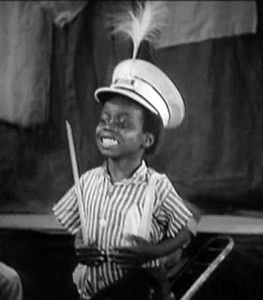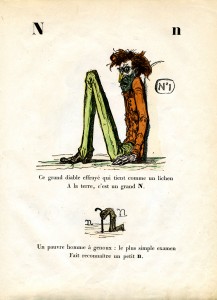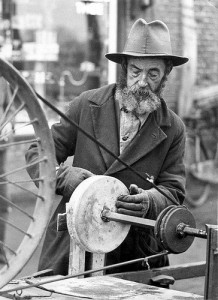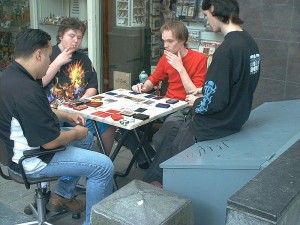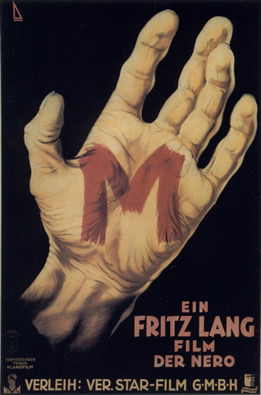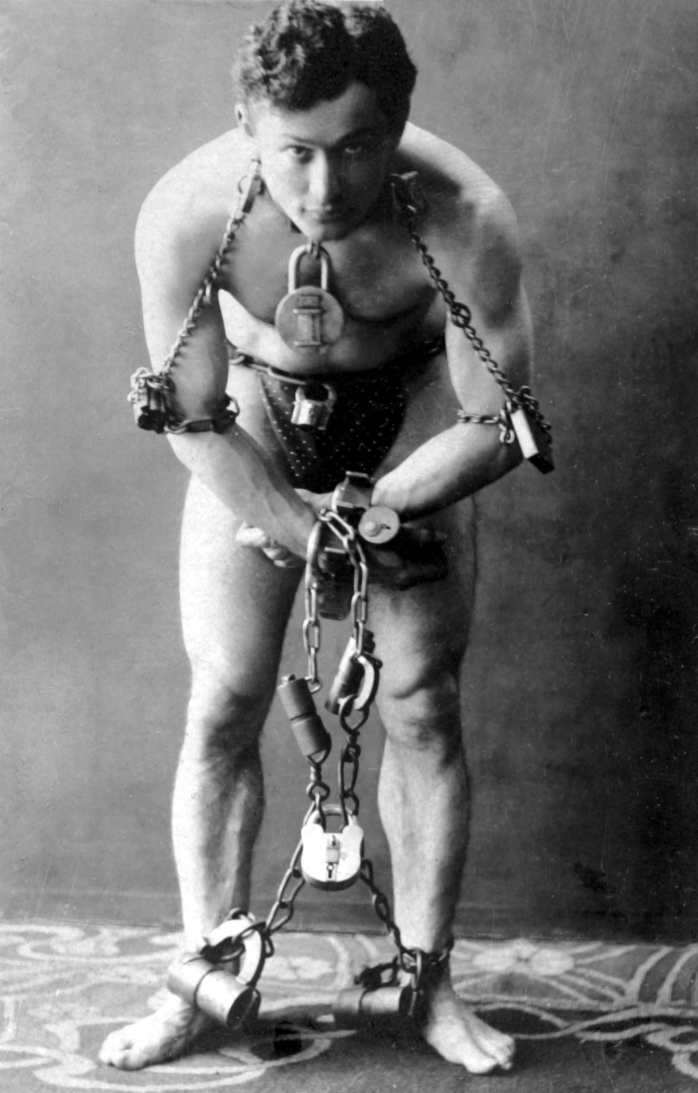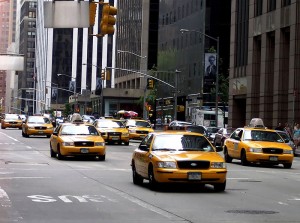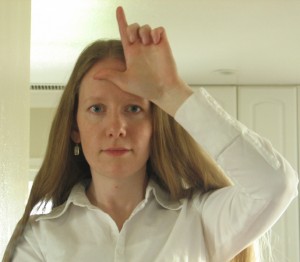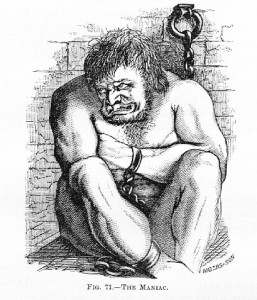French firm Wysips makes a thin film that attaches to phone displays and traps solar energy. Available in 2012.
You are currently browsing the archive for the Urban Studies category.
Venezuelan performer Juan Caicedo shows his skills.
Caicedo mentioned in a review of Barnum’s circus from an 1883 Brooklyn Daily Eagle: “Juan Antonio Caicedo, a Venezuela artist did some wonderful things upon a wire. His somersaults upon a thin line of steel, so fine as to hardly be discernible, were simply wonderful.”
Tags: Juan Caicedo
The opening of “Hollywood Elementary,” Adrian Nicole LeBlanc’s 2006 New York Times article about children training for a career in show business:
“Nine-year-old Jaysha Patel doesn’t cry easily, but on a recent morning, she was ready to weep. She took a chair facing her fellow actors in a bland conference room. The mothers, who sat in the back, seemed oblivious: one knitted; another placed stamps on a pile of picture postcards of her son, which would alert casting directors to the air date of his latest show. Meanwhile, Trisha Simmons, the children’s very pretty teacher, offered her aspiring students a couple of tips: ‘Short breaths help you to cry. Tightening the throat helps.’ Simmons looked resplendent in a bright purple hooded jacket and a rhinestone belt, circulating among her charges, some as young as 5. ‘Take your finger out of your nose,’ she chided one, then stopped to squint at a boy. ‘What’s that on your lips?’ she asked.
‘Powdered doughnut,’ he admitted.
The workshop, Crying on Cue, was taking place at the Oakwood Toluca Hills, a vast complex of temporary rental apartments in Los Angeles that caters to families actively pursuing a Hollywood career. In addition to housing, the Oakwood offers the Child Actor Program, which brings industry professionals, like Simmons, onto the premises and has made the Oakwood a much-sought-after residence for aspiring child actors. Simmons and others teach specialized, marketable skills: ‘If you’re a kid, and you can cry, you’re going to have a long road ahead of you — lots of work,’ Simmons says. She’s a working actor whose résumé includes roles in Desperate Housewives and Will and Grace.“
I NEED SOME OLD NEWSPAPER (BAYSIDE)
Does anybody have some New York Times, Newsday news paper from the month of January, February that don’t need it.
Please I do need it for a project for school. I had them but my mother trought it away by accident. Now I need it .
Please any help will appreciate. I prefer in the are of Queens but I go anywhere. Or if some people know how can I get this.
Thanks.
Okay.

Tyler Cowen: "Maybe it is stretching the concept, but you can interpret Bill Gates and Steve Jobs as amateurs too."
An excerpt from a post by economist Tyler Cowen on Marginal Revolution about the merits of amateur efforts:
“Amateurism is splendid when amateurs actually can make contributions. A lot of the Industrial Revolution was driven by the inventions of so-called amateurs. One of the most revolutionary economic sectors today — social networking — has been led by amateurs. Maybe it is stretching the concept, but you can interpret Bill Gates and Steve Jobs as amateurs too.
Amateurs are associated with free entry and a lot of experimentation. Barbecue quality is very often driven by amateurs, and in general amateurs still make contributions to food and cooking. The difficulty of maintaining productive amateurs is one of the reasons why scientific progress periodically slows down. Specialization, however necessary it may be, can make big breakthroughs harder at some margin. This is one aspect of the division of labor which Adam Smith did not fully grasp, though he hinted at it.
Through computers, and the internet, the notion of amateurs working together is becoming more important. This includes astronomical searches and theorem-proving, plus collection and collation of data, and Wikipedia; this is Shirky’s ‘cognitive surplus.’”
Tags: Adam Smith, Bill Gates, Clay Shirky, Steve Jobs, Tyler Cowen
Naturalization: The process by which an alien acquires citizenship. A naturalized citizen in the United States has all the rights except that he cannot become president or vice-president. By the law of 1906, every alien, on his arrival in the United States is registered, and certificate of registration given him in case he should desire to apply for citizenship. No less than two nor more than seven years after filing this declaration the alien must make petition to a competent court, rehearsing these facts, stating that he is not an anarchist, and that he wishes to be naturalized. He must have two credible witnesses, citizens themselves, who confirm his statement, assert that he has been a resident of the United States for five years and of the state for one, and that he is of good moral character. The petitioner must be able to speak English unless he is naturally dumb, or has a homestead entry on public land. Foreign Africans can be naturalized but not Chinese.
New Surgery: This promises remarkable achievements in the future–even “sight to the blind” and “new life to the heart.” An enumeration of some of the feats already accomplished include: insanity cured, due to neuralgic pain by trephining the skull and taking out the “fifth” nerve; criminals restored to normal life by relieving a certain pressure on the brain: “new” bones formed by transplanting dead or living bones to living bodies; whole joints removed and others put in new places; kidneys transplanted from one animal to another; skin transplanted from the body of one person to another; skin removed from dead or living bodies kept “alive” in the laboratory by chemical means and made to grow; broken backs mended, skulls repaired with bones from some other parts of the body, new faces made, dead nerves supplemented with nerves of animals, useless lungs, kidneys, spleens and stomachs removed; injured hearts, livers and other organs stitched; paralysis and brain failure cured by draining the spine or brain, brittle arteries reinforced with gold wire. By means of electric bulbs and mirrors the interior of the throat and lungs is examined. The New Surgery also provides measures for the amelioration not only of the individual condition, as in the removal of the tonsils and the appendix to prevent serious dangers, but also for the actual betterment of the race itself by the prevention through simple surgical means, of the production of offspring by criminals, as well as by others, who might transmit hereditary physical or other defects. The Rentoul operation for severing the tube conveying the seminal fluid of the male, one that involves merely nominal risk, has been adopted in regard to criminals in this country as, for instance, in Connecticut, and might be adopted by those who, afflicted with hereditary troubles, yet also appreciate the dire effects of tainted heredity upon the race generally. Real relief would come by the instruction of children, in family and school, in the nature of the human body, and the terrible results of vice.
New York City: The greatest city of America and the second greatest of the world. It was founded by the Dutch on Manhattan Island (1613) with a few trading huts. Regular colonization began in 1622. New Amsterdam, as it was called, passed into English hands and became New York (1664), but the Dutch policy of patroonships, or large land holdings with tenant farmers, kept town and colony behind New England and Pennsylvania, until after the Revolution, when the genius of Hamilton, the Clintons, Morris and Livingston laid the foundation for its unparalleled prosperity. Its peculiarity of narrowness and immense length, of crowded population and high land values, developed by unbounded wealth and the possibilities of modern steel construction, have produced on Manhattan Island a new architecture, with towering office buildings and palatial apartment houses, ten to fifty stories high. They darken the densely crowded streets, but have a strange and startling effect of grandeur. Cathedrals and pyramids dwindle at their side. Nowhere is the terrible force of modern civilization so impressed on the daily unconscious thought of man by his inherent necessities. It is a gorgeous, crashing, magic city, robbed of weirdness and grotesqueness by the skill of a modern school of architects, whose variety in design, color and decoration, added to modern resources in building-stone, tinted brick and concrete, never wearies the eye and produces a skyline of impressive splendor. The communications and transportation of the thronging myriads are effected by every device of subway, elevated roads, electric and cable lines; organized ability and achievement, aided by the acquired good sense and good nature of a people accustomed from childhood to its imperial wonders.
Nose: The organ of smell, so placed above the mouth that the odor of whatever is placed therein must be immediately perceived.
Nostalgia: A longing for the old home and friends which in sensitive natures produces melancholia and even death. It appears to be most frequent among mountaineers, including the Swiss, Trolese, Norwegians and Dalmatians.
•Taken from the 1912 Standard Illustrated Book of Facts.
See also
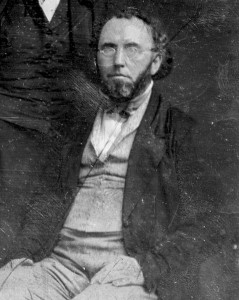
Transcendentalist and literary editor George Ripley founded Brook Farm in Massachusetts. It was no Utopia.
From “Utopia & Dystopia,” Paul La Farge’s excellent 2010 BookForum essay about the horrifying nature of Utopian settlements (both fictional and actual), from Sir Thomas More forward:
“The history of real-world utopias bears his observation out. One of America’s best-known utopian experiments was performed at Brook Farm, in Massachusetts, where members of the Transcendentalist intelligentsia, among them Nathaniel Hawthorne, tried their hands at a communal life inspired by the writings of Fourier. The Brook Farmers lacked the funds to live well and the skills to live cheaply; they went into debt and argued about doctrine, and when their half-built phalanstery burned down in the spring of 1846, the community went into a decline from which it did not recover. The most enduring monument to Brook Farm is Hawthorne’s novel The Blithedale Romance (1852), which, far from praising the experiment, describes a group of city folk going obstinately to seed, their minds numbed by work, their hearts ablaze with impractical and ultimately tragic romantic combinations.
The Brook Farmers’ misfortune was small compared with that of the Icarians. It’s hard to see how Cabet’s novel could have inspired anyone to serious activity; nevertheless, in 1848, sixty-nine French people, dressed in black velour uniforms, set sail from Le Havre for Texas, where they were to establish a colony. They settled on the Red River, where they caught yellow fever; by the time Cabet arrived with the second group of colonists, a year later, their society had fallen apart. The Icarians relocated to Nauvoo, Illinois, whence the Mormons had just been chased: Presumably the real estate came cheap. Fifteen hundred Icarians gathered in Nauvoo, but they accomplished little, aside from printing a tract in which Cabet described how nice a society he could make if someone were to give him half a million dollars. The group split; Cabet and his loyalists departed for Saint Louis, where Cabet died a few days later. The remainder of the group bought land in Iowa, which so depleted their resources that they lived for years in mud houses and walked around in wooden shoes. Their splendor was all in their ‘somewhat elaborate’ constitution, drafted by Cabet, ‘which lays down with great care the equality and brotherhood of mankind, and the duty of holding all things in common; abolishes servitude and service (or servants); commands marriage, under penalties; provides for education; and requires that the majority shall rule.’
Eventually the Icarians built a schoolhouse and a dining hall, but their society failed to enchant the outside world. Of the sixty-five members who moved to Iowa in 1856, thirty were gone by 1860; the last Icarians disbanded in 1898. Most utopian societies met similar ends: The Harmonists of Pennsylvania lost their money in a lawsuit; the Separatists of Zoar dwindled to nothing. The Oneida Perfectionists, notorious in their day for practicing institutionalized polyamory, fell into scandal and squabbling, then reformed themselves into a silverware company that left its members to form their own matched sets.” (Thanks Essayist.)
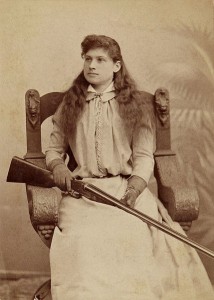
"She is always armed with shooting irons, and when a child she was the crack shot of the mining camp."
The mail carrier was a vital cog in American communications for most of our nation’s history. The September 13, 1900 Brooklyn Daily Eagle profiled a unique member of the profession, Sarah M. Burks, the only female mail carrier in the West at the time. Sarah had a particularly treacherous route: She was armed when she traveled and the area streams were poisoned. An excerpt:
“Miss Sarah M. Burks is probably the only woman mail carrier in the West, says the Kansas City Journal and her route is one of the most desolate conceivable. From St. Johns to Jimtown, A.T., she travels twice a week, covering a distance of 208 miles, as the towns are 52 miles apart. The interesting country is practically a wilderness, the settlers being few and far between.
It would be difficult to imagine a more uninviting region than that traversed by Miss Burks. What tiny streams there are poisoned by alkali. Navajo Indians and occasionally an Apache are somewhat plentiful, but white men seldom go there, and then only to get the gold, silver and copper. Nothing in the way of vegetation can grow there. It is simply a region of rich minerals deposited in titanic volcanic action ages ago.
Along the western border of this desolate, uncanny wilderness Miss Burks rides twice a week. Generally she is alone, and if she has a companion he is likely to be a miner, a commercial traveler, or mayhap a lawyer, who has rented a horse from Miss Burks’ father, and she is to collect payment and to see to the care of the horse. She is always armed with shooting irons, and when a child she was the crack shot of the mining camp at Hurqua Hala.
Her hat is a wide straw. She wears short skirts of blue serge, a corduroy or canvas jacket, leather leggings and heavy shoes.”
Tags: Sarah M. Burks
It’s seven feet tall, 300 pounds, roams North Carolina and is utterly ridiculous.
An April 4, 1898 letter from a reader to the Brooklyn Daily Eagle:
“To the Editor of the Brooklyn Eagle:
Some time ago I wrote to the Eagle asking what could be done in regard to the scissor grinder who insists upon blowing a trumpet each and every day in front of my home. It startles me most awfully. As to my baby I fear it may be the means of throwing her into convulsions.
K.D. McNeill”
Tags: K.D. McNeill
Orson Welles believed in the product. (Thanks Documentarian.)
Tags: Orson Welles, Paul Masson
Milkmen, street sweepers, grinders, etc. (Thanks Live Leak.)
Marriage: In law, a civil contract establishing the status of a man and a woman united in lawful wedlock; the relation of husband and wife. In its ethical sense, it is, in all Christian countries, a mutual compact, based on regard and affection, to live together as husband and wife, until death. Its purpose is to perpetuate the family and the race, to preserve moral and social purity, and to properly rear the young. The marriageable age is especially regulated by statute in the various States; under the common law it is 14 years in the male, and 12 in the female.
Mixed Races: The subject of mixed races is intimately connected with the study of both ethnology and atavism. It involves a consideration of the phenomena attendant upon the sexual union of individuals belonging to different varieties of the human race. Two phases of mixing of races are particularly interesting to North Americans, the result of the mixing of white and negro blood, and the amalgamation of various white races, belonging to every strata of society, from the descendants of generations of oppressed peasants, to scions of high nobility in what has been termed the “American Melting Pot.” The mingling of European nations seems to produce a strong and thoughtful race, combining the finest elements of those who are, from the struggle to emigrate, the best physical specimens of their people, and now the United States is increasing the difficulty of admission, thus aiding the natural principle of selection. The result of amalgamation among more distant races, as exemplified in the population of Central and Southern America and the Eurasians of India, have not commended themselves to the American mind, and there is a strong opposition to the admission of Chinese and Japanese, the finest of non-Caucasian races.
Morgue: Originally a prison court for the identification of prisoners in France, then applied to a building on the Seine behind the cathedral of Notre Dame, Paris, where the bodies of the drowned and other unknown dead are exposed for identification and police inspection. This practice is now usual in all large cities. The period of exposure is usually 72 hours, and the unidentified bodies are then buried by the city or given to anatomists. To avoid morbid curiosity, only adults with an interest in identification are admitted, and a careful record is preserved of physical appearance and peculiarities.
Moving Pictures: About 1903 the stock of films in existence had gradually become sufficiently numerous to enable the establishment of small theaters with frequent changes of views. They became very popular and by 1905 had driven the traveling exhibitors of moving pictures practically out of business. There are now upwards of 10,000 such theaters in the United States alone, and they are proportionately numerous all over the civilized world. Receipts of such theaters range from $200 to $5,000 weekly according to size and location. Over fifty reels (lengths of 1,000 feet) are now produced weekly so that one person could spend two or three hours daily and never see a repeated picture. The business of the ordinary theater has been seriously affected, and the lower class of melodramas has been entirely eliminated. Moving pictures are of course liable to great abuse, as vulgar and vicious films have sensational interest, but the manufacturers have voluntarily submitted their products to a respectable censorship, and they have become the best, cheapest and most instructive amusement. In its far-reaching effects, the invention of moving pictures is one of the greatest in the history of science.
Murder: The crime of killing a human being with malice aforethought; an idiot is irresponsible; an infant under fourteen goes to the reformatory. Killing in hot-blooded quarrel without premeditation is manslaughter, punishable with imprisonment, not death; and killing in self-defense, or when a house is broken into at night is justifiable. But if a man shoots at one and kills another, or kills, even in self-defense, when caught in burglary, it is murder. Intoxication is not an excuse, nor provocation, when it does not give absolute necessity of self-defense. Most American states punish murder by death, but a mawkishness of juries, and the technicalities of evidence and specialist arguments for insanity of criminals often defeat justice. European practice is stricter.
•Taken from the 1912 Standard Illustrated Book of Facts.
See also
Today is Harry Houdini’s birthday and the following excerpt from his obituary in the November 1, 1926 New York Times reveals how the man who eventually made an elephant “disappear” initially got his start in show business:
“Houdini was born on March 24, 1874. His name originally was Eric Weiss and he was the son of a rabbi. He did not take the name Harry Houdini until he had been a performer for many years. Legend has it that he opened his first lock when he wanted a piece of pie in the kitchen closet. It is certain that when scarcely more than a baby he showed skill as an acrobat and contortionist, and both these talents helped his start in the show business and his later development as an ‘escape king.’
At the age of 9 Houdini joined a traveling circus, touring Wisconsin as a contortionist and trapeze performer. The Davenport brothers were then famous, doing the first spiritualist work ever seen in this country. They would ring bells while bound inside a cabinet and would agree to free themselves from any bonds. This inspired Houdini to a somewhat similar performance. Standing in the middle of the ring, he would invite any one to tie him with ropes and would then free himself inside the cabinet.
In the ring at Coffeyville, Kan., a Sheriff tied him and then produced a pair of handcuffs with the taunt:
‘If I put these on you, you’ll never get loose.’
Houdini, still only a boy, told him to go ahead. After a much longer stay in the cabinet than usual, the performer emerged, carrying the handcuffs in his free hands. That was the beginning of his long series of escapes from every known sort of manacle. For years he called himself the Handcuff King, a title discarded as he extended and elevated the range of his performances.
From 1885 to 1900 he played all over the United States, in museums, music halls, circuses, and medicine shows, gradually improving his technique and giving up his purely contortionistic and acrobatic feats. In 1900 he made his first visit abroad, and in London his sensational escapes from handcuffs at Scotland Yard won him a six months engagement at the Alhambra. This was the first instance of his cleverly obtaining notoriety by a public or semi-public exhibition outside the theatre. No other showman, unless it was Barnum, knew better how to arouse the curiosity and amazement of the public in this manner.”
••••••••••
Tags: Harry Houdini
“Well, the reception that was accorded you makes me feel that your face is reasonably familiar to the public.”
Four years before this TV appearance, Elizabeth Taylor, who was essentially raised as a ward of MGM, graduated with the senior class at Hollywood’s University High School: From a 1950 Life magazine: “Between movie scenes for the last eight years Elizabeth Taylor has adjourned to the schoolroom on the M-G-M lot to keep up with her schoolwork. Last week, after a final year of studying (civics, English literature, ceramics and Senior problems), Elizabeth joined the senior class of Hollywood’s University High School to get her diploma. The 17-year-old actress (18, Feb. 27) finished with a B-plus average and her teacher rated her ‘a good student, very good in art, with a flair for writing.'”
Tags: Elizabeth Taylor
For better and worse, Joe Meek‘s biography sounds a lot like Phil Spector’s. Tone deaf but deeply ambitious, Meek was the maverick, experimental British record producer of the 1960s who used unique sounds to turn out a slew of successful singles, including the first Brit hit to reach number one on the U.S. charts (“Telstar,” by the Tornados). But he was more unhinged than unorthodox and when his career nosedived, depression and poverty were followed by violence. In 1967, Meek used a shotgun to take his landlady’s life and his own. The Documentarian posted the first part of a film called “The Strange Story of Joe Meek.” Watch parts 2-6 here.
An excerpt about Meek from Stoned: A Memoir of London in the 1960s: “Joe Meek was even crazier than Phil Spector. He would use a Ouija board to get in touch with Buddy Holly to find out whether the record was gonna be a hit. He felt the whole of the music industry was against him, that they were out to pinch his ideas–I think because when he used the sound of lightning to start up a record, EMI sent the record to their labs to try and analyse it. There was an evil about Joe. He was known to crawl around graveyards taping cats hissing, he was into the occult. He was a split personality. He believed he was possessed, but had another side that was very polite with a good sense of humor. He was very complicated; when he was young his mother used to dress him in girls’ clothes.”
Tags: Joe Meek, Phil Spector
Thief – thanks for stealing my bike, jerk (Midtown)
Hey, thief who stole my nice Bianchi from 55th between 7th and 8th, thanks so much for making my life miserable. I know you stole many bikes from that rack, but that was my main mode of transportation. Now I’m screwed because I can’t afford a new one.
Here’s to hoping you get sideswiped by a cabbie. Or, that someone sees you riding my Blue Bianchi with blue wheels around town and takes it back. I’d offer a reward, but I’m broke.
Jerk.
Very sincerely your enemy now,
Fletch
Yoshiyuki Sankai at Tsukuba University has created exoskeletons that increase the limb strength by ten times. Older folks barely able to walk become ambulatory again. (Thanks Singularity Hub.)
Tags: Yoshiyuki Sankai
Liberal: A political term meaning, where used, those who take advanced views, and welcome changes that promise betterment in public affairs, in contradistinction to the Conservative who usually favors letting well enough alone.
Lincoln, Abraham: The great president of the United States during the Civil War. He was the son of Thomas and Nancy Hanks Lincoln, born in Hardin County, Kentucky, of English-Quaker stock, and passed his youth amid the then rough frontier environment of the middle west, where anti-slavery sentiment prevailed. His early education was self-acquired, mostly by voracious reading; and his first business training was secured while serving as a clerk in a general store, where, by fair dealing, he earned the nickname of “Honest Abe.” In 1846 he was elected to Congress and in 1860 was nominated for the Presidency. In 1861 Lincoln was elected after a spirited campaign. He came to office at a time when the country was torn with the anti-slavery agitation, when the Civil War, long impending, was breaking out, and throughout the four year struggle he stood, often alone, firmly contending for the abolition of slavery and the preservation of the Union, strong in the faith that ultimately the nation would emerge from the period of stress and strain, greater and more prosperous than ever. He brought the country successfully out if its travail, and by the weight of the burden, “Honest Abe,” became the “Man of Sorrows.” For the service to the nation he paid with his life; he was assassinated by John Wilkes Booth, an actor, while witnessing a play in the box at Ford’s Theatre, Washington D.C., on the night of April 14, 1865, one month after his second inauguration. In personal appearance, Lincoln was very tall with legs out of all proportion to his body. He stood 6 feet, 4 inches in height and weighed about 180 lbs. When he sat, he usually crossed his legs or rested them on the arm of his chair; standing, he stooped slightly, and had the general appearance of a consumptive. His facial expression stamped him a man of long cherished sorrow, yet his sense of humor was exceptionally keen and he possessed a never-failing fund of witty stories. As an orator he is conceded one of the greatest America ever produced.
Literature, American: It may be well to admit at the outset that America has never produced a world writer. The nearest approach to it, in poetry in Longfellow and, in prose, Emerson.
Lottery: A game of hazard in which prizes are drawn by lot. Lotteries are said to have been first employed by the Genoese government for the purpose of increasing its revenue. The first lottery in England seems to have been in the year of 1569 and the profits went to the repair of rivers and harbors. They were long tolerated both in England and the United States, though from 1830 onward until they were abolished there was an ever-growing sentiment against them. The most notorious ever was the Louisiana lottery at New Orleans. It went out of existence in 1890.
Love-apple: An old name for the tomato.
•Taken from the 1912 Standard Illustrated Book of Facts.
See also
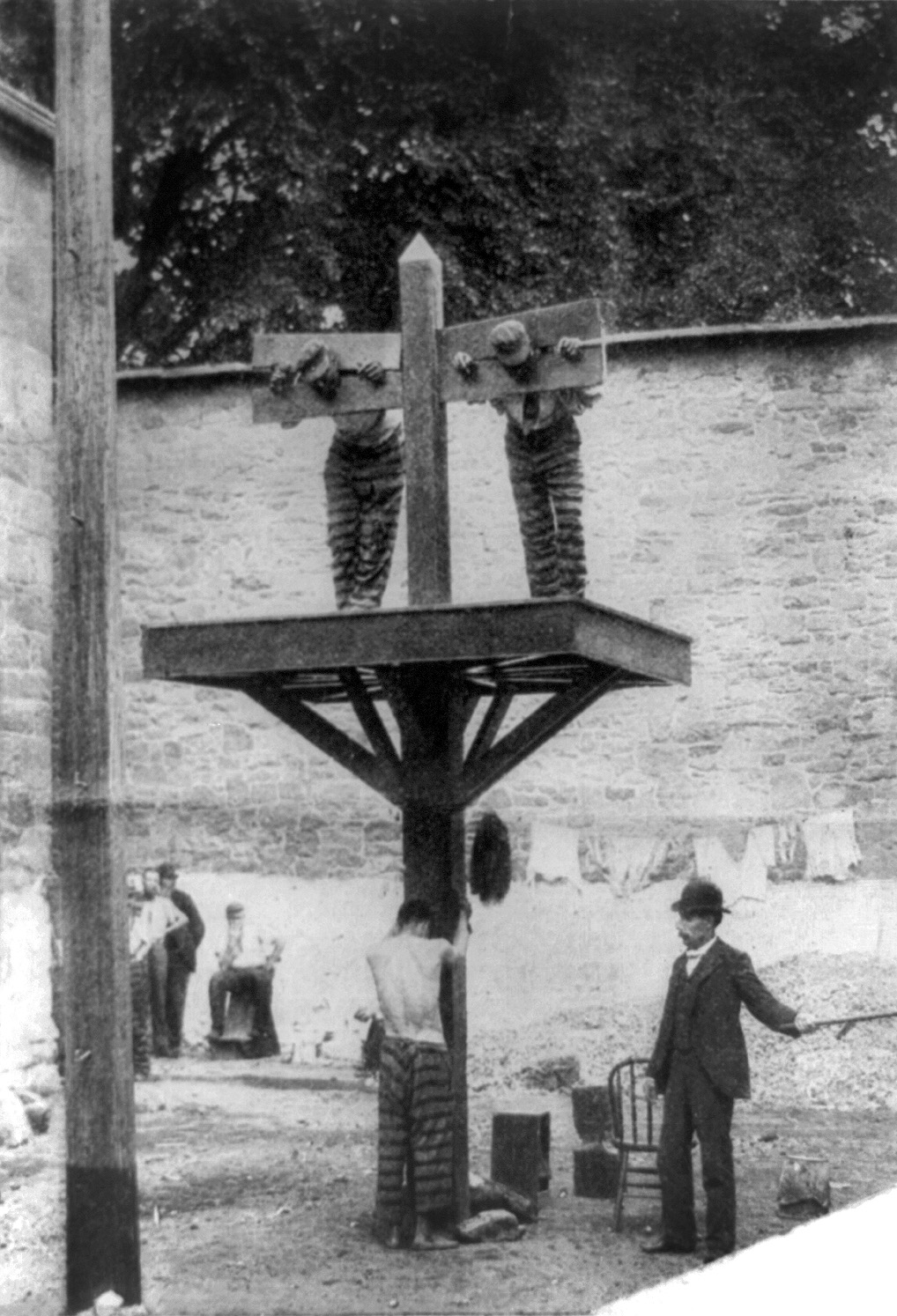
"The instance is rare where a man voluntarily selects a penal institution for his home and refuses to leave it, even when threatened with physical ejection."
If you were looking for someone to help you plan a prison break at the Raymond Street Jail in Brooklyn during the latter part of the nineteenth century, James Davis was definitely not your man. Even though he never committed a crime, Davis checked into the jail one day as if it were a hotel and never checked out–even when ordered to. Because he was a useful guy and caused no grief, a succession of sheriffs allowed the unusual living arrangement to continue. The October 25 1896 Brooklyn Daily Eagle profiled the curious “convict.” An excerpt:
“Raymond Street Jail has been prolific in characters, most of them bad. Some of them almost beyond redemption. They have nearly all of them pined for freedom, but all of them have been compelled to wait till the law had been satisfied. There have been a few cases in prisons and penitentiaries to the state where long term convicts have been disinclined to leave the bars after having been pardoned, or at the expiration of their sentences. The instance is rare where a man voluntarily selects a penal institution for his home and refuses to leave it, even when threatened with physical ejection. Such a man, however, may be found in the institution over which Sheriff Buttling presides. His name is James Davis. The denizens of the place refer to him and have for many years as Jimmie. Sometimes they call him Jimmie the Paup. Paup with them is a contraction for pauper. They have named him as they have named others with sobriquets that are more laughable to their cult than they are elegant, accurate or appropriate.
Davis has been a voluntary prisoner in the Raymond Street Jail for twenty-one years. He is an undersized individual of perhaps 55, and wears a little black mustache. His strong characteristic is his silence on all topics, except for prize fighting. On the latter three-fourths of his conversation is devoted to eulogy of Peter Maher, whom he thinks the greatest disciple of fisticuffs the world has ever seen. Comparatively little is known of the early life of Davis, and in fact, comparatively little effort has been taken by the individual himself to communicate any knowledge to those among whom he lives. He is wary of all strangers, and runs away generally when they move forward to investigate him. His value to every sheriff for the past twenty years in this county has been great. Sheriff Buttling, in speaking of him, to an Eagle reporter, said:
‘I can say many good things about our voluntary prisoner. He proves a very valuable man at times. He seems to have the ability to make the inmates do the work assigned to them, and is quick to report any violation of the jail discipline. Why he remains at the jail when he might be doing better for himself is something I do not understand.’
The books of the jail do not show that Davis has been guilty of any offense. He just strolled in many years ago and was allowed to occupy a cell in consideration of doing chores around the place. He spoke to few, went his own way and was in no way objectionable to any officials. From one cell, Davis gradually became the tenant of two. In one cell, Davis has a rather extensive collection of portraits of prize fighters. They are all cheap prints, many of them cut from advertisements, of gaudy colors and poor execution. Davis’ cell is always clean.
When Warden Shanley assumed charge of the jail Davis’ case puzzled him a good deal. He didn’t care to have the fellow around the place, because at that time he did not appreciate his value. He thought he would tell Davis to go and did so, but the voluntary prisoner would not budge. The warden quickly learned enough about him to see the propriety of retaining him. The fellow is certainly content. Sheriff Buttling says he believes that Davis would prefer his cell to a room in a mansion.”
The opening of “Life’s Swell,” Susan Orlean’s excellent 1998 Outside article about Maui surfer girls:
“The Maui surfer girls love each other’s hair. It is awesome hair, long and bleached by the sun, and it falls over their shoulders straight, like water, or in squiggles, like seaweed, or in waves. They are forever playing with it — yanking it up into ponytails, or twisting handfuls and securing them with chopsticks or pencils, or dividing it as carefully as you would divide a pile of coins and then weaving it into tight yellow plaits. Not long ago I was on the beach in Maui watching the surfer girls surf, and when they came out of the water they sat in a row facing the ocean, and each girl took the hair of the girl in front of her and combed it with her fingers and crisscrossed it into braids. The Maui surfer girls even love the kind of hair that I dreaded when I was their age, 14 or so — they love that wild, knotty, bright hair, as big and stiff as carpet, the most un-straight, un-sleek, un-ordinary hair you could imagine, and they can love it, I suppose, because when you are young and on top of the world you can love anything you want, and just the fact that you love it makes it cool and fabulous. A Maui surfer girl named Gloria Madden has that kind of hair — thick red corkscrews striped orange and silver from the sun, hair that if you weren’t beautiful and fearless you’d consider an affliction that you would try to iron flat or stuff under a hat. One afternoon I was driving two of the girls to Blockbuster Video in Kahului. It was the day before a surfing competition, and the girls were going to spend the night at their coach’s house up the coast so they’d be ready for the contest at dawn. On contest nights, they fill their time by eating a lot of food and watching hours of surf videos, but on this particular occasion they decided they needed to rent a movie, too, in case they found themselves with 10 or 20 seconds of unoccupied time. On our way to the video store, the girls told me they admired my rental car and said that they thought rental cars totally ripped and that they each wanted to get one. My car, which until then I had sort of hated, suddenly took on a glow. I asked what else they would have if they could have anything in the world. They thought for a moment, and then the girl in the backseat said, ‘A moped and thousands of new clothes. You know, stuff like thousands of bathing suits and thousands of new board shorts.'” (Thanks Longform.)
Tags: Gloria Madden, Susan Orlean

